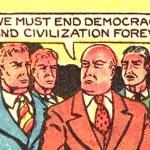British observer Mary Harrington thinks the United States is drifting back to the frame of mind that favors monarchy. Not because of Donald Trump, but because of a shift in thinking that she sees in political operatives of both parties.
She has written a piece for Unherd entitled The dawn of America’s monarchy with the deck “Pretenders to the throne will be annihilated.”
In a monarchy proper, as opposed to the constitutional kind, political legitimacy rests not in the system so much as in the person of the monarch: a king only becomes meaningfully a king when enough powerful people perceive him as having that special extra something that elevates him to royalty. And a pretender is someone else competing to be seen in this light — either by the same cadre of the powerful or by a rival cadre. In this situation, the only sure-fire way to eliminate the risk posed by a pretender is to eliminate the pretender.
But England developed another approach to government, one also adopted by the United States, which did away with the monarchy altogether.
This model views politics as properly a contest of ideas rather than individuals, conducted in a political space that at least aspires to neutrality. Political rivalries, in this order, are to be contained via a matrix of shared norms — one that, importantly, includes a convention of not imprisoning, persecuting, or bumping off one’s rivals.
Yes, allegiance to Donald Trump seems to be to his “person,” rather than to his ideas, as such. Harrington writes,
The surest evidence in favour of an American tilt towards autocracy comes not directly from Trump, or even from neoreactionary writers. . . . Rather, it lurks in the political class, in the tiers just below Presidential incumbents or hopefuls — and especially in the weaponisation of American institutions as tools of political persecution.
This is, increasingly, a bipartisan strategy. . . .A court in New York City ordered Donald Trump to pay a $354 million fine in a civil fraud trial, one of a plethora of ongoing efforts to impeach or otherwise hamper Trump via the courts.
The Democrats have been mobilizing the courts, the Justice Department, the FBI, and the CIA to punish Trump. Republicans have been trying to do something similar to Joe Biden with congressional hearings and special counsels, but so far with less impact.
Harrington says that “a new consensus is solidifying among the American political class: one that departs increasingly dramatically from its British constitutional forebear”:
In this emerging order no one expects to persuade their opponents. . . .There is no point contesting ideas, if people’s loyalties are tribal. But if this is so, how do you win? The answer appears to be: by capturing institutions, then going after the other tribe’s leader. There is no such thing as neutral regulatory, governance or administrative infrastructure in this existential struggle against political opponents. . . .
An order seems to be emerging in which victory requires more than just defeating opposition parties: it necessitates the annihilation of rival pretenders. And in turn implies the replacement of a politics of ideas, by one of divinely marked persons. Should this order consolidate itself, it will, whatever the window-dressing, be a monarchical regime.
She notes that the English influence is declining in the United States, so it isn’t surprising that the Anglo-American political tradition in this country is fading too. That heritage has been targeted by the “progressives.” Ironically, they are the ones who are calling Trump such a threat to democracy that he needs to be annihilated, sounding like the anti-democratic rulers of old.
“At present,” Harrington concludes, “the keenest supporters of American diversity are generally also those loudest in expressing anxieties about a putative Trumpian Caesar. It will be ironic in the extreme if it does turn out that the real bulwark against autocracy was America’s now rapidly dissolving Anglo heritage.”
Illustration: Henry VIII, King of England, by Hans Holbein the Younger – Galleria Nazionale d'Arte Antica, Public Domain, https://commons.wikimedia.org/w/index.php?curid=76791967












